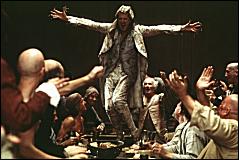![[Deep Focus]](../../flicker/longo.gif)

The Marquis de Sade, party animal.
![[Deep Focus]](../../flicker/longo.gif)
|
|
| Quills
|
|
 |
C+ |
|
The Marquis de Sade, party animal. |
|
|
Movie Credits: Directed by Philip Kaufman Written by Doug Wright, from his play Cinematography by Rogier Stoffers Edited by Peter Boyle Starring Geoffrey Rush, Joaquin Phoenix, Michael Caine, and Kate Winslet USA, 2000 Theatrical aspect ratio: 1.85:1 Screened at Lincoln Plaza Cinemas, New York, NY
|
Philip Kaufman has always struggled to find the balance between the everyday business of Hollywood filmmaking and the more aloof aesthetic of the European art film. The results have varied from solid genre fare (Invasion of the Body Snatchers) and American epic portraiture (The Right Stuff) to uncomfortable thriller (Rising Sun) and sprawling Kundera adaptation (The Unbearable Lightness of Being). The Kundera seemed to cement his reputation as a talented director of erotica (though I dare say even Jack Valenti could have shot a reasonably erotic film given the same cast and source material). Kaufman followed it up with Henry & June, the first film to receive the MPAA's NC-17 rating — the new equivalent of the X, meant to ghettoize art films rather than pornography. I'm unsure how honestly erotic Henry & June turned out — I'd compare it to the eroticism of a strong cup of coffee on a winter day, more bracing than actively sensual. By that measure, I'd describe Quills as warm milk: mild and slightly curdled. It's a smutty movie for arthouse bluehairs. Or, more to the point, it's The Pillow Book as produced by Merchant Ivory. The film is set almost entirely within the confines of Charenton, the asylum where the Marquis de Sade (Geoffrey Rush) spent the final years of his life. He lives in relative luxury in a spacious, well-equipped cell, with plenty of quill pens with which he scribbles out his sexually obstreperous prose. Charenton is overseen by the Abbe de Coulmier (Joaquin Phoenix), a defrocked priest with a progressive attitude toward mental illness. When outraged officials learn that Sade has smuggled an erotic novel, Justine, out of the institution, they decree that Pierre-Paul Royer-Collard (Michael Caine), a notorious hard-ass, be brought in to restore order. Having arrived, Royer-Collard forcibly takes a young wife (Amelia Warner), an orphan who was promised to him by nuns years ago, and proceeds to decorate his home to her opulent specifications by day while forcing himself on her at night. As depicted by Kaufman, working from a screenplay by Doug Wright (in turn based on Wright's play), the Marquis de Sade is a talented, ribald yet cynical man with a passion for the written word. What begins to truly drive him mad is the loss of his beloved quills, which allow him to give ink-and-paper shape to his ceaseless erotic musings. Rush plays him as a mad but appealing genius who only loses control when his ability to create is taken away from him. As the softcore smut peddler explained it to Max Renn, Videodrome was dangerous because it had something that porn merchants didn't — a philosophy. Similarly, the Marquis de Sade didn't just write dirty books (although he did do that). He wrote dirty books with a philosophy. What's really lacking in Quills is the sense of classist entitlement that made Sadean sexuality simultaneously revolting and alluring. Here, the writer who embodied the cruel decadence of aristocracy is presented mainly as a crusty old hard-on with a vigorous interest in vulvas and assholes and a talent for charming his nursemaids. Eventually — and I should have seen this coming — the marquis whips the whole asylum into a bacchanalian frenzy, with the nigh-demonic power of his very words tipping the balance within Charenton from a queasy semi-sanity to out-and-out madness. This key sequence is meant to be both scary and invigorating, but I found it frankly risible. And don't even get me started on the overbaked Coulmier's Lust subplot, which inevitably culminates on-screen in a garish manner that would please the marquis himself but is unfortunately misplaced in an attempt to, I suppose, shock the audience. Thank goodness for the corseted Kate Winslet, the good Lord's gift to costume drama. Her character, Madeleine, is a maid at Charenton who collects the inmates' laundry and helps Sade smuggle his writings out with the sheets. Madeleine embodies the intellectual curiosity that leads a reader to Sade in the first place, busting open the drab shell of quotidian existence. (According to Sade's diaries, the real Madeleine was a 16-year-old daughter of a Charenton nurse; she allowed the old man to bugger her 64 times in exchange for money, which might have spiced this film up considerably.) Toward the end of the film, Rush does finally gather that Sadean arrogance about him, but the sourness merely seems to have been thrust on him by the circumstances of his imprisonment. The film finally reveals little about one of history's most flamboyant sexual iconoclasts. Fine, you say. But we're not in school today, so what about the film? Well, because Quills plays as a tract against censorship, its portrayal of the Marquis as merely a dogged free thinker with an obsessive talent for pornography makes the argument go down too easily. Although the film suggests the ways that such ideas may lead the impressionable reader to acts of atrocity and thus arrives at some degree of ambiguity, it never really engages with Sade's work, but merely endorses the idea of erotic freedom in general. To that end, it skewers its manufactured hypocrites decisively but unconvincingly, like fish in a barrel.
|
 http://www.deep-focus.com/flicker/
bryant@deep-focus.com
http://www.deep-focus.com/flicker/
bryant@deep-focus.com